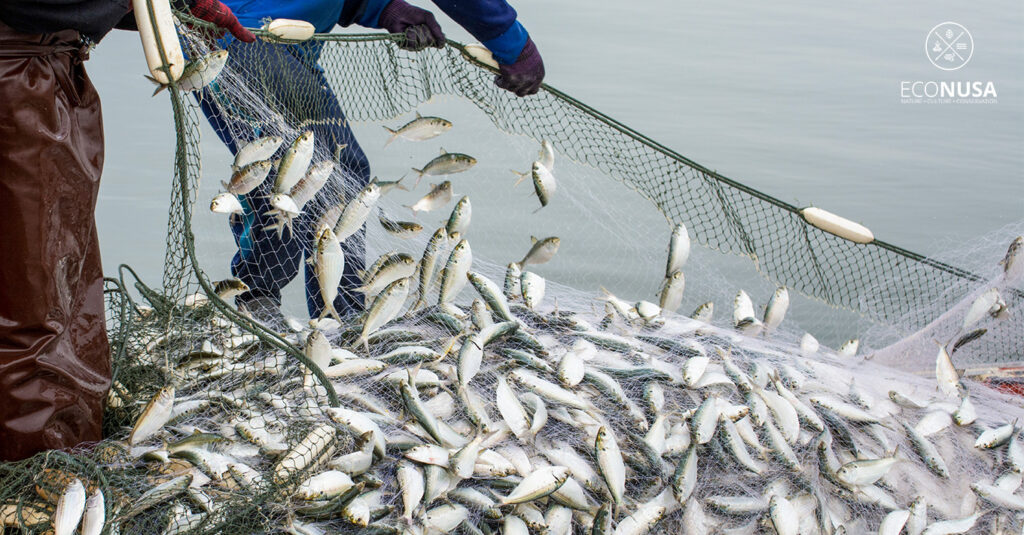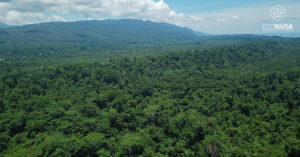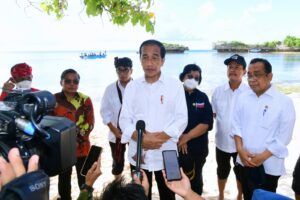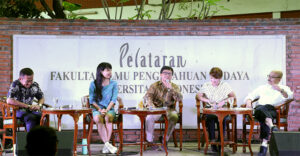
Implementation of policy related to maritime and fisheries resources management should get special attention so as to become one of the Indonesia economic standpoints in the future. Equal and sustainable resources management serve as the definite requirement to create triple win to the community, nature, and economy.
The acting Director for Policy Reform and International Relation of the Indonesia Ocean Justice Initiative (IOJI), Grace Gabriella Binomo, reminded the importance of maritime and fisheries resource management in equal and sustainable manner. This is summed up from the symposium of the Indonesian Forum for Maritime and Fisheries University Leaders (FP2TPKI) on 17-19 May 2022 in Ternate, North Maluku.
Grace refers to Article 33 of the 1945 Constitution stipulating that earth, water, and natural resources are under the state’s possession and utilized for the maximum benefit of the people. But in practice, it is far from the concept. Injustice continues to happen in various maritime and fisheries sector.
Read also: Menke Womom, Imminence Proof of Abun Tribe and Oceans God
“The maritime and fisheries resources concern with public lives. However, injustice keeps happening. There are water space grabbing, sea contamination, unequal distribution of economic benefit, women marginalization, and human rights and indigenous people’s rights violation,” said Grace.
Concerning with human rights protection of fisheries migrant workers, Grace recommended the government to speed up the issuance of government regulation on protection and placement of fishing boat crews and ship crews. She also regretted the government plan to impose a contract system on the utilization of fisheries resources. As to her, the plan should be carefully anticipated.
“Reflecting from the past experience, when the foreign ship and former foreign fishing boat were allowed to catch fish on the exclusive economic zone in 2000-2014 the compliance of business actors were very poor. Supervision could hardly be done. Double licenses practice and criminal act were massively found,” said Grace.
Read also: Illegal Fishing Practice Still Rampant in Indonesian Oceans
With the size of 6.4 million kilometers of sea with the second longest coastline in the world, Indonesia has very huge economic potential from sea. The potential is also supported by the abundance of other resources such as mangrove forests expanding around 2.7 million hectares and 3 million hectares of seagrass. The Indonesian mangrove and seagrass are on the top largest in the world.
Unfortunately, the climate crisis makes the sea potentials without maximum management. Coastal and small islands areas are estimated to be the most affected areas due to climate crisis. The rising sea surface, beach storm, sea water heating and acidification, hydrology cycle change, biodiversity drop, clean water shortage, are some incidents the coastal and small islands communities will cope.
EcoNusa’s Ocean Program Manager, Wiro Wirandi, said that sea in Maluku Island and Tanah Papua are deemed the last frontiers to Indonesia dealing with the resources potentials. Wiro cited an example of the high biodiversity on the “bird head” area of Papuan Island as the home of coral fish.
Read also: Climate Crsis Threatens Indonesian Fishermen’s Welfare
“In 2014 we found the new species. There is a home to more than 90 percent of the world coral fish. Unluckily, climate crisis will create bleach the coral reefs and make them die. I have never gone there since then on. Will it have the same condition today?” Wiro wondered.
He said that one of the effects of climate change is sine from the declining number of Indonesian fish stock. Compared to that of in 2017, the estimated fish stock declined around 500,000 tons. Scientific study analysis is mandated by the Decree of Maritime Affairs and Fisheries Minister No. 19/2022 on the Estimated Fish Resource Potential, Eligible Number of Fishing, and Utilization of Fish Resource at the Indonesian Fisheries Management Area (WPP).
Editor: Leo Wahyudi









